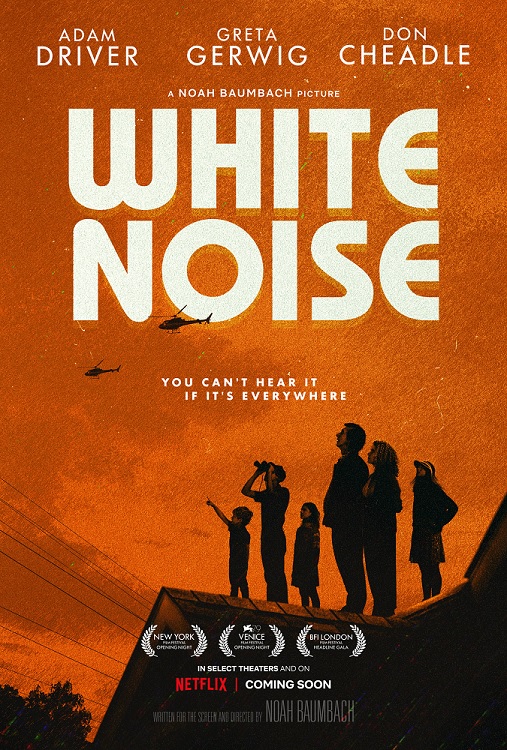"IT'S FORGIVING NATURE IS ODDLY COMFORTING"

Despite all their self-mythologisation, filmmakers are still ultimately mortal," states The Independent's Clarisse Loughrey at the beginning of her review of White Noise. "So it’d be entirely forgivable if they’d spent the past few years preoccupied with death. Why else would Noah Baumbach have been so drawn to make White Noise? This is, after all, an adaptation of Don DeLillo’s supposedly “unfilmable” novel that positions fear of the grave as the driving force behind every American ideal, from station wagons to Elvis Presley.
"DeLillo’s language is severe and enchantingly precise; every individual in his world is a philosopher lecturing to no one but themselves. His book is set in the Eighties and concerns a miniaturised apocalypse triggered by a cloud of chemicals – not an obvious fit, then, for Baumbach, whose films (Marriage Story; The Meyerowitz Stories) largely concern the most intricate neuroses of modern-day, self-branded intellectuals. But there is nothing more self-centred, perhaps, than a fear of death. And even the director’s most likeable characters, such as Greta Gerwig’s freewheeling protagonist of Frances Ha, suffer from acute narcissism. The effect here is that his White Noise comes across far more sentimentally than DeLillo likely ever intended. Yet its forgiving nature is oddly comforting."
After a couple of paragraphs about the film's story, Loughrey continues:
Baumbach has omitted one of the most famous passages of DeLillo’s book, in which his characters visit the “Most Photographed Barn in America”. The author uses it to theorise that our reality is now so documented and commodified that it ceases to exist as an independent state. We’re never looking at the barn as it is, but only at the barn as it’s been photographed. Rather than try and clumsily translate the passage onto film, Baumbach instead finds his own way to integrate that idea into the very language of his adaptation. White Noise, therefore, swings wildly between cinematic allusions – there are car chases, hints of Spielbergian wonderment, touches of David Lynch’s dream logic, and Brian De Palma’s lurid thrillers. It ends with a musical dance sequence set to LCD Soundsystem.Much like the “Most Photographed Barn in America”, these references create distance. They help us face the mortal terrors of White Noise with a little more ease. The same could be said of the Gladney’s familiar rituals, from their supermarket trips to their daily verbal pile-ups. But Baumbach also suggests these might be nothing but harmful delusions, ultimately making us blind to fate. The spectacle of society may be our only comfort, but could it also herald our ultimate doom?
At Premiere, Frédéric Foubert writes that "Noah Baumbach explodes the framework of his cinema" -
Baumbach kneads the themes of DeLillo: the disintegration of the family by media saturation, the anguish of death, the appetite of the society of the spectacle for chaos and destruction (a thought for Nope). Serious, therefore, but treated in the tone of a savage farce.The comic power and poetic fury of the source material allow Baumbach to burst the seams of his cinema. We think at times of the azimuted comedies of David O. Russell: the same taste for the ruptures of tone, the toupee actors, the "zinzinerie" cartoon. Where we remember that Noah Baumbach is also the co-screenwriter of Madagascar 3: Kisses from Europe… The film, which begins as an intellectual comedy, turns halfway through to an indie variation on Spielberg's War of the Worlds ( yes, yes), before playing it 80s thriller, with visual quotes from Brian De Palma in support. It's a lot, probably too much, for a single film, but Baumbach here portrays a man who counts the days he has left to live, and it's as if he himself counted the films what remains for him to do. And that he took advantage of it to shoot several at the same time, put in thrillers and SF adventures that he has never done, and will probably never do. Some will probably find it a bit indigestible. The rest will nod and smile during the fun end credits, punctuated by an unreleased LCD Soundsystem song, "New Rumba Body". Noah Baumbach asked musician James Murphy to write "a joyous song about death". That's also a good way to describe the movie.



